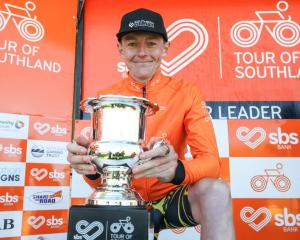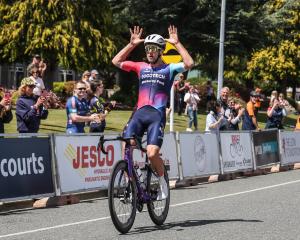When the Tour de France starts on Saturday, some cyclists may as well wear targets on their backs.
Anti-doping officials are boosting their arsenal and preparing to use it like never before at cycling's main event, with several riders out of the 180 in the cross-hairs already before the three-week race begins in Monaco.
Focusing on suspicious competitors is one of the major innovations at this year's Tour, which is hoping to eradicate the doping scandals that have obliterated the sport's image in recent years.
Pat McQuaid, the head of the International Cycling Union, says the race will be the most rigorously tested event in history. There will be about 520 doping tests.
"(I'm) neither an optimist or a pessimist (that) it could be the year that we get no scandals," said McQuaid on Monday. "There's always an idiot out there who will try something."
In recent weeks, 50 riders likely to compete in the Tour have faced enhanced anti-doping tests. That includes team leaders, race favourites and an unspecified small number of riders with suspicious profiles, McQuaid said.
The list of suspects has been drawn up based on the UCI's new "biological passport" program. In it, riders have provided blood or urine samples compiled in individual body chemistry profiles that anti-doping officials can compare to their race-day parameters.
Any fluctuations from the athlete's known baseline levels could possibly be doping - in effect, searching for evidence of doping rather than individual illegal substances.
McQuaid says the passport has acted as "a huge deterrent" to cheating.
Levi Leipheimer, an American with the Astana team who has three race victories and four stage wins this year, said the passport suggests "they are tightening the net around doping and dopers."
"I think that's a great thing," Leipheimer said on Monday. "Maybe in the future we'll look back and say it improved from this date."
Among other new tactics, doping testers will indicate which riders they want to target as late as 15 minutes before the end of each stage - hoping to catch cheaters off-guard.
Testers will also freeze riders' samples and store them, in the hope that if anti-doping checks are unable to turn up drug use today, maybe some day they will.
McQuaid said that, as in years past, the stage winner and overall race leader will be automatically given doping tests after each stage, along with six other cyclists.
The designer drug of choice in recent years has been the blood-booster EPO and - increasingly last year - an advanced version called CERA. Doping chiefs are also on the lookout for so-called blood doping - a practice in which riders extract their own blood, store it and inject it when needed.
Such transfusions have been difficult to detect, but the top anti-doping official in France has said he expects a relevant test to be perfected.
Pierre Bordry, the head of France's anti-doping agency, said in an interview last week that his testers understand blood doping better thanks in part to former rider Bernhard Kohl.
Kohl, who retired last month, finished third at last year's Tour before being caught using CERA. He has said his doping went undetected despite giving numerous samples.
The World Anti-Doping Agency has given sports authorities the go-ahead to use revised methods to catch athletes cheating with EPO - one of the most widely abused banned substances in cycling.
Bordry, whose agency is working with the UCI this year, has refused to reveal the new techniques of his testers to deter cheaters.
Before the Tour starts, all riders will give two blood samples that will be tested and stored. Then, throughout the race, two testers will conduct the sampling after each stage. Cyclists will have chaperones to escort them to test centres.
Drugs use has simply ravaged the race's image in recent years.
Perhaps the leading 2009 Tour favourite - 2007 winner Alberto Contador of Spain - sat out last year after organisers excluded his Astana team because of doping allegations. In 2007, Contador was able to win in part because then-leader Michael Rasmussen of Denmark was ousted for lying about his whereabouts during doping controls before the race.
A total of six riders were disqualified in doping scandals last year.
Former German rider Joerg Jaksche, who retired last year because no one would hire him after he detailed doping practices, said he will assume that whomever wins the Tour will have doped.
"I experienced it myself - doping simply helps too much," Jaksche said in Sunday's edition of Berlin's Tagesspiegel newspaper.
He was the first cyclist to admit using blood doping in the 2006 Spanish scandal known as Operation Puerto, and co-operated with sports authorities in exchange for a reduced one-year ban.
Some current riders still grumble about cycling's bad image when it comes to doping.
"It's so narrow-minded to think cycling is a sport for dopers," British sprint specialist Mark Cavendish recently told The AP. "It's not like you're born, you're a cheat and you go: 'Oh, cycling's the sport for me.' It doesn't work like that but that's the perception of it."












